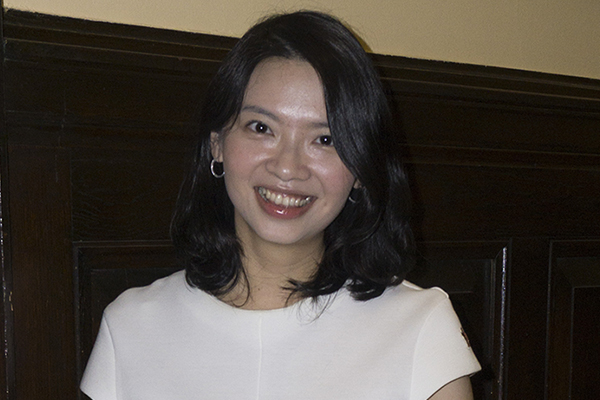Helping Taiwan Communicate with the World: Hsu-Ping Tuan (M.A., TESOL)

Chinese may be the world’s most widely spoken language, but Hsu-Ping Tuan believes that English is the key to advancing Taiwan’s fortunes on the global stage.
“We really want other countries all over the world to get to know us,” says Hsu-Ping, who received her master’s degree in TESOL (Teaching English to Speakers of Other Languages) in May. “But to do that, English is very important. It’s a way to communicate with others – to talk about education and politics and also to do business.”
The Taiwanese government has made English a top education priority – but to little avail.
“Many Taiwanese students who received more than a ten-year formal English education still struggle with communicating with people in English,” Hsu-Ping says, adding that teaching methodology is to blame: “The teacher will assign a long list of Chinese sentences to translate into English. There’s a lot of emphasis on learning grammar, but very little on everyday conversation. In fact, the teacher will typically speak for the entire class period – there is little interaction, so students do not learn to question or think for themselves.”
“We really want other countries all over the world to get to know us. But to do that, English is very important. It’s a way to communicate with others – to talk about education and politics and also to do business.”
Hsu-Ping decided years ago that her life’s mission would be to change that picture. She would go abroad to study more effective methods of teaching English and then return home to found a school dedicated to that purpose – and to modeling its approach for the rest of the country. While still in college, she began saving money from each job she held.
Two years ago, Hsu-Ping was accepted at three top graduate schools of education. She chose TC because “it offered the courses to help me integrate knowledge from psychology, neuroscience as well as English teaching” as well as “the field work to apply what I’ve learned in classrooms.”
As she heads back to Taiwan later this summer, Hsu-Ping is confident she made the right choice. She credits TESOL faculty members such as Catherine Box, John Balbi, Vivian Lindhardsen, Howard Williams and Hoa Nguyen with helping her recognize the importance of incorporating a communicative component into language courses. She will reinforce the idea that “we acquire language best when the language is learned within contexts. Teachers should help students learn vocabulary and grammar within contexts instead of teaching them in isolation.”
She also is grateful to Patricia Martinez Alvarez, Assistant Professor of Bilingual Education, for “reminding me that instead of negatively labeling students or asking them to accommodate to a given environment, we should instead try to accommodate their needs to better serve them.”
Hsu-Ping has been working on her language school the entire time she has been at TC, and, in partnership with the CEO of a Taiwanese education organization, is set to open it in Taipei, the nation’s capital, in Spring 2018. She hopes to open additional branches soon, and to work with the government on creating a new national English curriculum that, beyond improving students’ language abilities, will foster critical thinking.
It is that ability, most of all, that she feels she developed at TC. “You are challenged here every day, and that helps you to realize your full potential. Which is what education should be about.” – Joe Levine
Published Wednesday, Jun 7, 2017